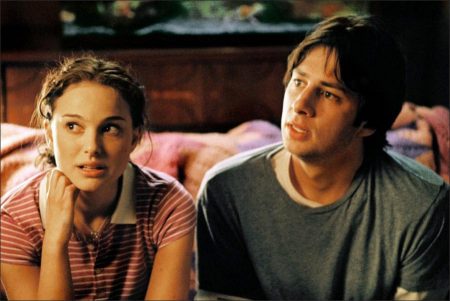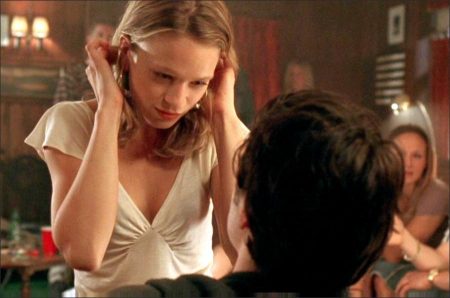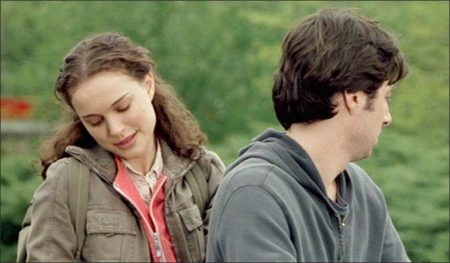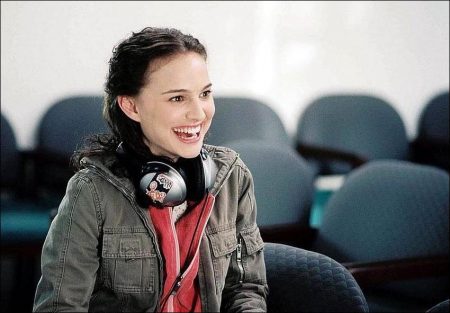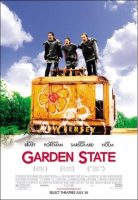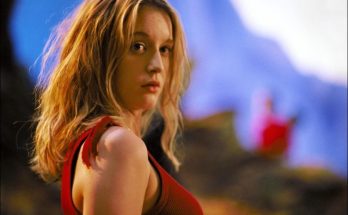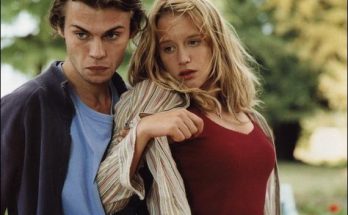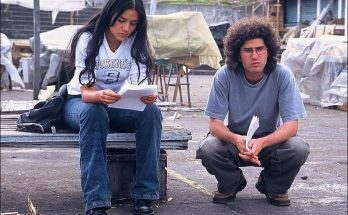“Maybe that’s all a family really is; a group of people who miss the same imaginary place.”
“I wanted to make a smart love story for young people, and I wanted to make a movie that got across the genuine feeling of what it’s like to come home,” says Zach Braff, the writer, director and star of Garden State. To do that, Braff felt he needed to abandon the traditional three-act Hollywood movie structure taught in screenwriting classes. “I got tired of watching movies with the same outline, where X needed to happen 30 minutes in, or else,” he says. “So many films follow that structure because it’s so hard to get a movie made if it doesn’t.”
Instead, Braff created a film in which events unfold “as they would if you’re this guy who comes home all of a sudden. You run into people you once knew, you hang out with them. Then maybe you never see them again. In the case of my character, he also buries his mother and falls in love. A lot happens in this one weekend.”
Garden State is a comedy, but as Braff’s co-star Natalie Portman observes, “It also has a heart. A lot of funny stuff these days is so cynical, but there’s nothing cynical about this movie. It’s untraditional and unlike anything I’d ever seen before. That’s what made it exciting.”
In a larger sense, the film is about the awkward period between adolescence and adulthood. “I remember when I went away to college, I was so ready to get out of New Jersey,” says Braff. “But when I got to school I was completely homesick, even though I didn’t feel like the house I grew up in was my home anymore. So I was missing a place that didn’t really exist. When you become an adult, your job is to create the concept of home for yourself and your children.”
Braff, who plays Dr. John “J.D.” Dorian on the NBC sitcom “Scrubs,” originally came up with the idea for a film homage to his native New Jersey while still in college. Over the years he collected anecdotes and wrote scenes here and there, but it wasn’t until 2000 that he finally sat down and banged out a draft of Garden State in three months.
“I originally called the film LARGE’S ARK,” says Braff. “I always liked the biblical story of Noah’s Ark, the idea of some great power starting the world again. For me, the idea was that Large himself is trying to begin anew. He’s trying to rescue all the parts of himself that he likes and start a whole new chapter of his life, the way Noah put the animals and people on the ark and saved them from the apocalypse and started again. He’s trying to find his ark.”
Pamela Abdy, a former executive at Jersey Films, the production company owned by Danny DeVito, Michael Shamberg and Stacey Sher, says of her first reading of the script: “I finished reading Garden State and I had the most desperate need to meet the person it came from. I knew it was special, and even though I had a meeting with Zach the next day I wanted to get in my car right then and find him.”
Richard Klubeck and Jersey Films subsequently signed on as producers of Garden State, followed by Gary Gilbert and Dan Halsted’s Camelot Pictures, who also provided financing for the film. “We read the script and loved it,” says Gilbert, “and after meeting Zach and hearing his vision for the film, and getting a sense of his passion for the project, we were in.”
The Residents of Garden State
When it came to casting the film, Braff says he was “incredibly lucky.” “I remember thinking it would be amazing to get someone in the spirit of a Natalie Portman, someone like Ian Holm, someone like Peter Sarsgaard,” the director recalls. “We never imagined in a thousand years we would actually get them. But one by one they all signed on. We were in shock.”
Braff, like many moviegoers, first took note of Portman when she played Timothy Hutton’s 13-year-old love interest in the 1996 Ted Demme film BEAUTIFUL GIRLS. “Natalie is such a movie star,” he says. “It’s not just being a great actress, which she is, and not just being beautiful, which she is. It’s that she is also so charismatic, you can’t take your eyes off of her.”
During the production, Braff learned that Portman also has a lot in common with her onscreen persona. “She’s silly, charged with optimism and passionate about life, and it all comes through in her character.”
For Portman, who was coming off of her role as Senator Amidala in the STAR WARS prequel trilogy, Garden State offered a complete change of pace. “I was excited to do something that was more of a character story after doing something so big and crazy.” Her character, Sam, is as far from the regal and burdened intergalactic stateswoman Amidala as she could be.
“Sam is a funny girl,” Portman says, but more importantly, “she’s a whole character. Most female parts written by a guy, especially romantic parts, turn out to be his weird ideal of what a girl ought to be: she’s hot, she takes off her clothes a lot, and she also really likes sports. But as written by Zach, Sam is a real person – she has problems, she’s got a sense of humor, but what I really appreciated was that she’s as interesting and complex as the male characters.”
That complexity – and humor – is part of what attracts Large to her and eventually allows him to deal with his pent-up emotions head-on. “Throughout the movie Large is going from this really detached state to beginning to understand how to feel again,” says Portman. “Meanwhile, she’s someone who’s so alive and so connected to everything that it starts to bring that out in him. Also, he comes from this really cold background and she’s so grounded and has this really warm family, and she provides a kind of home for him.”
Braff elaborates, “Sam is the polar opposite of Large. She’s so full of hope and so energized and so excited to be alive. He’s baffled by her energy and her charm and he falls for her because she’s just so spectacular. I think it’s a pretty universal male fantasy that a woman’s going to come along and save you, to rescue you from yourself.”
Peter Sarsgaard plays Mark, a vaguely amoral and deeply unmotivated gravedigger at the cemetery where Large’s mother is buried. Mark still lives at home with his pothead mother (Jean Smart), who aspires to greatness but is dating a classmate of Mark’s who is employed as a “knight” at the local medieval-themed restaurant. Mark’s ambitions don’t extend much beyond the incomplete collection of Desert Storm trading cards he hopes to parlay into early retirement.
Braff had seen Peter Sarsgaard’s chilling portrayal of John Lotter in Boys Don’t Cry. “He’s terrifying in that, and I really believed he was that guy. One of my pet peeves is when uber-famous actors play regular guys because they want to stretch – and the whole time you’re watching you’re thinking ‘I don’t believe for a minute he’s really that guy.’ Peter is a great everyman and he’s a chameleon, he just becomes the part.”
Sarsgaard describes Mark as “the metaphorical sheriff of the town.” A man who knows that anything can be had for the right price – even in suburban New Jersey. After receiving the script, Sarsgaard recalls, “I thought it was so funny and it would be a fun movie to make. In this movie, with my character, you feel like you can do anything.”
Indeed, one morning Sarsgaard showed up for an early call in a tuxedo – hardly in keeping with his character’s slacker wardrobe. But the actor had been out so late the night before it hadn’t made sense for him to go home to change. Although coming to the set in black-tie resulted in “something of a `walk of shame’” in front of the rest of the cast and crew, Sarsgaard says his mindset was perfect for the scene they were about to shoot – the morning after the film’s big party scene.
By the end of Garden State, Mark’s character goes through a metamorphosis, which, while subtler than Large’s, is no less profound, “There’s this epiphany that leaves everyone changed,” says Sarsgaard. “Interestingly though, you don’t spend a lot of time seeing how they’ve changed. You just know they’re about to.”
As Braff puts it, “The last third of the movie is about Mark redeeming himself. He’s a guy who does what he has to do to get by. But he commits this one act of pure friendship.”
For the role of Gideon Largeman, the main character’s emotionally distant father, Braff sought out the Oscar-nominated actor Sir Ian Holm, best known for his work in Chariots of Fire, The Sweet Herafter and the Lords of the Rings saga.
The character, Braff explains, is “The Oz of the whole story. Large thinks of his father as the great puppet master, but it turns out he’s a little old man in his tightie whities crying on the edge of his bed.”
“Gideon wants everyone to be happy,” says Braff. “We all know people like this who want something so bad they just ruin everything. In trying to please everyone, he ends up making them all miserable. He had access to medicine and thought that as patriarch it was his responsibility to make them all happy. He’s not malicious.”
Still, in the final conversation between Large and his father, Large gives voice to something that is left unsaid between many adults and their parents. “Everyone has that thing they want to say to their parents,” observes Braff, “and maybe you even say it, but you’re not always sure they’ve really heard it. In that scene, we get the sense that Ian’s character really hears it for the first time.”
“I saw Ian in The Sweet Hereafter and he just blew me away,” Braff adds. ““The day he called me to say yes, he said `Zach, it’s Ian Holm.’ I said `Oh my God.’ He said `No, just Ian Holm. I want to play Gideon.’
“Then I met him and he’s the sweetest most generous, humble guy. Here I am some kid from New Jersey giving this famous British actor direction. The guy’s a knight for God’s sake! But he came to play and he was just wonderfully collaborative and fun.”
The feeling was mutual. “Zach is a brilliant young director,” says Holm. “He’s got it all at age 28. It was very good for an oldie like me to be associated with someone so young and full of energy.”
Like Portman, Holm came to Garden State’s indie production having recently starred in a mega-budgeted effects-driven franchise, in this case, Peter Jackson’s The Lords of the Rings trilogy. Holm, whose recent films include summer tent pole films The Day After Tomorrow and The Aviator, is an almost ghostlike presence in Garden State, his pale face and white helmet of hair often appearing seemingly out of nowhere and catching Large off-guard. But while Gideon haunts the film, he also serves as a warning to his son of what Large could become if he doesn’t make a major change in his life.
Holm describes Gideon as “a man of a certain age who has dark secrets. He’s an authoritarian who took it out on his son, fed him lithium from early age, and caused him great pain. It’s like ‘King Lear.’ It was never resolved between the two of them.”
Rounding out the cast are Method Man (Soul Plane, How High) as Diego, the hotel bellman and peepshow proprietor; Ron Leibman (Auto Focus, Dummy) as Dr. Cohen the neurologist; and Jean Smart (Bringing Down the House, Sweet Home Alabama), as Mark’s stoner mom.
Discovering the Garden State
“I do apply myself Mom; everyday. I work my ass off burying dead people, okay? I’m only 26. I’m not in any rush. What’s your rush for?” – Mark
Braff says he was inspired to make Garden State because he felt there were few films that spoke honestly to his generation, to people in their twenties who were “beyond adolescence and for whom at one point or another a whole new sense of overwhelming anxiety sets in.”
He observes that, “People my age are not getting married right away. As a result, they have more time to question themselves and everything around them. I wasn’t seeing a whole lot of films that gave an honest account of what it felt like to be a 20-something in 2004.”
A student of film, Braff has been observing directors since he was 18, when he played the small role of Woody Allen and Diane Keaton’s son in Allen’s Manhattan Murder Mystery Braff later appeared in Lisanne Skyler’s Getting To Know You, which debuted to critical acclaim at the 1999 Sundance Film Festival and The Broken Hearts Club, an ensemble comedy about a group of gay friends in Los Angeles that was acquired by Sony Pictures Entertainment.
“Every time I work with a new director, it’s like going to film school. On `Scrubs,’ we work with a new director each week. I get to see lots of different styles, and I take what I love and leave behind what I don’t.”
But Braff is quick to admit that on Garden State, “It was a big challenge directing a scene while acting in it. It can be tough to do the two together.” Peter Sarsgaard laughed that at times Braff “would have one eye on the monitor” when he was acting off camera in a scene. Nonetheless, Sarsgaard says he has the ultimate respect for Braff’s ability to act and direct at the same time. “What I’ve learned from this movie,” Sarsgaard says, “is that I probably couldn’t do it.”
Sarsgaard also praises Braff for “always knowing what the shot’s saying, in addition to knowing what the actors are saying. He knows how to make the two go together. He knows how any given shot will complement what’s in the script, because he’s agonized over it. I always feel confident he’s shooting it right. I know he’s got a master plan.”
Portman, who worked with actor-director Woody Allen in Everyone Says I Love You, also was impressed with Braff’s directing style. “He’s got an amazingly confident way about him without being dictatorial. He’s really open to collaboration. As an actor, I realize he doesn’t have a director watching him, so whatever I do with him is also like directing within the scene. You’re constantly pushing each other. It’s an interesting and cool way to work.”
Segueing from the mega-budgeted Star Wars films to a low-budget indie film was refreshing for Portman. “It’s really fun to work on something where a lot of the cast and crew are young,” says the actress, now 24. “It’s not that I don’t appreciate working with people who are more experienced and wiser, but there’s a creative feeling when you’re working with people who aren’t jaded and still feel the magic of film and just want to make something beautiful.”
Seeing Is Believing in the Garden State
“In a bad storm, I like to pretend this old boat’s my own private ‘ark.’ Unfortunately, if this is the apocalypse, I’m not quite sure it still floats.” – Albert
In conceiving the look for Garden State, Braff, whose hobby is black and white still photography, drew inspiration from filmmakers who were keenly attuned to composition. He cites Woody Allen’s Manhattan, the films of Hal Ashby and Stanley Kubrick as well as the serene suburban menace of Todd Haynes’ Safe as influences.
Braff and Director of Photography Lawrence Sher went in to the production with a clear idea for the look of the film. “We tried to create a specific visual style that involved a lot of wide lenses, crane shots and bird’s eye views but not a lot of camera movement,” says Sher.
The film’s modest budget and short 25-day shooting schedule pushed the cast and crew to do more with less. For instance, most scenes had to be shot in one or two takes. “We were just flying through the script rather than laboring over it, which I think is good,” says actor Peter Sarsgaard. “A joke just isn’t funny anymore after take 12.”
Time constraints also mandated that post-production be handled in the most efficient way possible. Because the film was shot during Braff’s hiatus from “Scrubs,” he only had six weeks to cut the movie after shooting ended. To get a jump on that process, he took the unusual step of beginning editing while the film was still in production, working at night and on the weekends.
The film’s script, and its ark, provided a definitive roadmap for Judy Becker’s production design. Water flows through Garden State like an ever-widening stream; from Zach’s mother’s bathtub, to Jesse’s giant swimming pool, to an ark teetering on a yawning abyss in the rain.
“In some places the water theme is something we’re barely conscious of like faucets dripping,” says Braff. “Then there’s the whole idea of this gathering storm that finally arrives at the apex of the movie when Large finally kisses Sam on the crane.”
Unlike in many films about single people in their 20s, family plays a large role in Garden State. Andrew is the only child of a deeply depressed mother and emotionally distant father, while Sam comes from a loving, though highly unconventional family unit. Visually, the homes of these two characters reflect that dichotomy: Gideon’s house and Large’s Hollywood apartment are as spare and colorless as their family life, while Sam’s home is a chaotic, brightly hued zoo. The notable exception in the case of Gideon’s house is the hall bathroom Large’s mother redecorates in a dizzying floral print before she dies.
“This is a woman who is clinically depressed, and a month before she kills herself she has a burst of creative energy,” explains Braff. “It’s like when you watch an animal dying, they sometimes get a burst of adrenaline. It’s their last attempt to stay alive. She was clutching for a reason to live. I also liked the idea of her son disappearing into that creation.”
As it is for his fictional alter ego, Garden State was something of a homecoming for Braff – as well as for a number of the other filmmakers. “It was very important to me to shoot the film in New Jersey, not Canada or Los Angeles or anywhere else that might have been less expensive,” says Braff.
The setting was part of what attracted Sher, who grew up in Northern New Jersey, to the project. “It was an environment I knew and the script felt true and emotional and funny. He completely nailed the characters I remembered from when I was in high school.”
To lend to the film’s authenticity, Braff cast his real-life relatives as extras in the shiva scene, but ultimately the sequence in which they were featured was cut from the final film. “I had to call all my relatives and tell them the news,” Braff muses.
The production came completely full circle for Braff when he received a report from a location scout about a house he’d looked at for Garden State. The scout had rung the doorbell at a nice home in South Orange and asked the homeowner if she would be interested in renting out her house as a location for a film directed by the star of “Scrubs.” As it turned out, the scout was talking to Braff’s stepmother.
The Sound of the Garden State
“You gotta hear this one song, it’ll change your life I promise you.” – Sam
Large’s journey in Garden State takes place against a backdrop of soulful musical artists – some contemporary, some classic – that weave the story together. “I was tipping my hat to films like THE GRADUATE, HAROLD AND MAUDE and EASY RIDER,” says Braff. “What was so unique about those movies was that the music spoke of the time. In a way this film is a ‘state of the union’ of what’s it like to be a 20-something guy in 2004 – at least the 20-something guy I was and a lot of my peers were. So this is essentially the soundtrack of my life now.”
Given the film’s limited budget, getting the rights to the songs, including songs by Coldplay, Simon & Garfunkel and Nick Drake, was no slam-dunk. “The sort of money that was originally quoted could have funded a few small independent pictures,” says Braff. “I’m just thankful that after I showed them the sequences in which their songs were used, the artists or their estates, were generous enough to work within our budgets.” Other artists represented on the soundtrack include The Shins, Remy Zero, Colin Hay, Thievery Corporation and Zero 7.
“The music Zach chose is poignant and cinematic and it has a rhythm,” says music supervisor Amanda Scheer Demme. “It was a pure pleasure to facilitate and execute his vision.”
When it came to creating a score to supplement the songs, Braff turned to Chad Fischer, a singer-songwriter and record producer as well as a film composer. “I originally know Zach from his having chosen a song I wrote for the theme song for ‘Scrubs,’ says Fischer. “Then, when they were editing Garden State, Zach used a number of singer-songwriters whom I had produced including Colin Hay, Alexi Murdoch and Cary Brothers as the temp soundtrack.”
In the end, many of those songs made it into the final mix, as did Fischer’s production of the film’s bittersweet finale, “Winding Road,” written and performed by actress and songwriter Bonnie Somerville (“Friends,” “The O.C.”, “Grosse Pointe”). Fischer also provided spare underscoring that matched the rough, low-fi sound of the songs. “It’s music that sounds like a song without the vocals,” he says. “Lots of arpeggiated guitar chords and piano with the odd cello thrown in.”
Garden State (2004)
Directed by: Zach Braff
Starring: Zach Braff, Natalie Portman, Ian Holm, Peter Sarsgaard, Geoffrey Arend, Jackie Hoffman, Michael Weston, Christopher Carley, Armando Riesco, Amy Ferguson, Trisha LaFache
Screenplay by: Zach Braff
Production Design by: Judy Becker
Cinematography by: Lawrence Sher
Film Editing by: Myron I. Kerstein
Costume Design by: Michael Wilkinson
Set Decoration by: Heather Loeffler
Art Direction by: Laura Ballinger
Music by: Chad Fischer
MPAA Rating: R for language, drug use and a scene of sexuality.
Distributed by: Fox Searchlight Pictures
Release Date: July 30, 2004
Visits: 137
